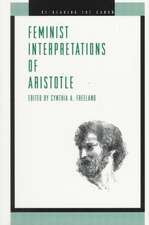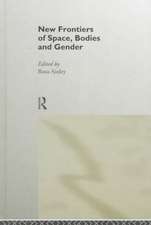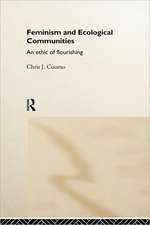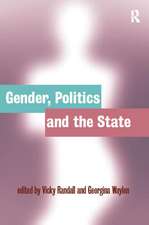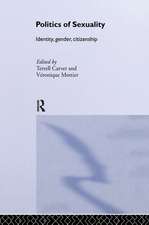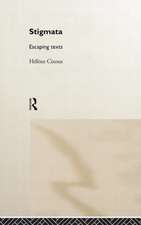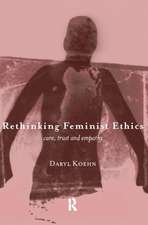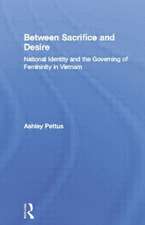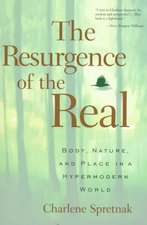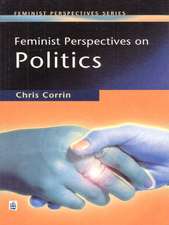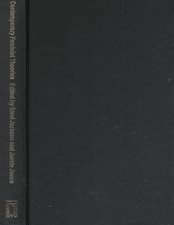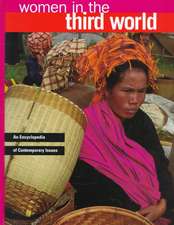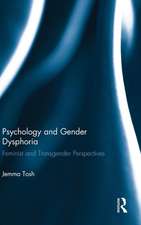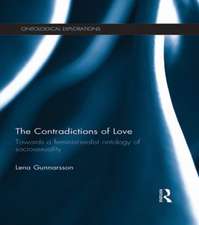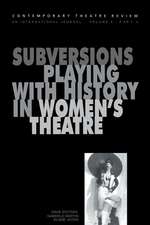Class: Feminist and cultural perspectives
Autor Ulrika Holgerssonen Limba Engleză Paperback – 30 aug 2016
| Toate formatele și edițiile | Preț | Express |
|---|---|---|
| Paperback (1) | 242.36 lei 6-8 săpt. | |
| Taylor & Francis – 30 aug 2016 | 242.36 lei 6-8 săpt. | |
| Hardback (1) | 762.16 lei 6-8 săpt. | |
| Taylor & Francis – 23 aug 2016 | 762.16 lei 6-8 săpt. |
Preț: 242.36 lei
Preț vechi: 293.72 lei
-17% Nou
Puncte Express: 364
Preț estimativ în valută:
46.38€ • 48.24$ • 38.29£
46.38€ • 48.24$ • 38.29£
Carte tipărită la comandă
Livrare economică 14-28 aprilie
Preluare comenzi: 021 569.72.76
Specificații
ISBN-13: 9781138886834
ISBN-10: 1138886831
Pagini: 146
Dimensiuni: 156 x 234 x 12 mm
Greutate: 0.2 kg
Ediția:1
Editura: Taylor & Francis
Colecția Routledge
Locul publicării:Oxford, United Kingdom
ISBN-10: 1138886831
Pagini: 146
Dimensiuni: 156 x 234 x 12 mm
Greutate: 0.2 kg
Ediția:1
Editura: Taylor & Francis
Colecția Routledge
Locul publicării:Oxford, United Kingdom
Public țintă
Postgraduate and UndergraduateCuprins
1. Introduction: Class—Why and How?
1.1. From Singapore to Sweden
1.2. The world after die Wende
1.3. Class—some fundamental distinctions
1.4. Class is dead, long live class
1.5. Feminist critiques
1.6. The cultural turn
1.7. The purpose of this books
References
2. Construction: The Grand Narrative of Class
2.1. The etymology of class
2.2. Class as conflict
2.3. Who were Marx and Engels?
2.4. The development of capitalist society
2.5. Historical materialism
2.6. Marxism after Marx
2.7. Class as situation
2.8. Who was Weber?
2.9. Class types
2.10. Class rather than status
2.11. Weberianism after Weber
2.12. Class and hegemony
2.13. Class and structuralism
2.14. Class just happens
2.15. Quantifying class
2.16. Feminist critiques of Marxism
2.17. Engels and Marxist feminism
2.18. Socialist radical feminism
2.19. Anti-racist class analysis and class critiques
2.20. The Birmingham School
2.21. The whiteness of the working class
Summary
References
3. Deconstruction: The Class Narrative Dismantled
3.1. Postmodern life
3.2. A postmodern working class
3.3. Postmodern critiques from the left or the right?
3.4. Jean-François Lyotard and postmodernism as narrative critique
3.5. Jean Baudrillard and the end of society and politics
3.6. Zygmunt Bauman and postmodernism as a state of mind
3.7. Once upon a time classes existed, and they mattered …
3.8. Beyond left and right?
Summary
References
4. Reconstruction: New Narratives About Class
4.1. Who were the workers?
4.2. The languages of class
4.3. Gareth Stedman Jones and the challenges of working-class history
4.4. Joan W. Scott and post-structuralist feminism
4.5. Patrick Joyce, postmodernism, and the crisis of social history
4.6. Post-Marxism
4.7. Class positions and forms of capital
4.8. Pierre Bourdieu’s theory of class
4.9. Beverley Skeggs’s feminist analysis of Bourdieu
Summary
References
5 Conclusions: Class Analysis, Past and Future
5.1. Class as classification, or, where to start
5.2. Class, a question of recognition and redistribution
References
Appendix: Dictionary definitions of class
Index
1.1. From Singapore to Sweden
1.2. The world after die Wende
1.3. Class—some fundamental distinctions
1.4. Class is dead, long live class
1.5. Feminist critiques
1.6. The cultural turn
1.7. The purpose of this books
References
2. Construction: The Grand Narrative of Class
2.1. The etymology of class
2.2. Class as conflict
2.3. Who were Marx and Engels?
2.4. The development of capitalist society
2.5. Historical materialism
2.6. Marxism after Marx
2.7. Class as situation
2.8. Who was Weber?
2.9. Class types
2.10. Class rather than status
2.11. Weberianism after Weber
2.12. Class and hegemony
2.13. Class and structuralism
2.14. Class just happens
2.15. Quantifying class
2.16. Feminist critiques of Marxism
2.17. Engels and Marxist feminism
2.18. Socialist radical feminism
2.19. Anti-racist class analysis and class critiques
2.20. The Birmingham School
2.21. The whiteness of the working class
Summary
References
3. Deconstruction: The Class Narrative Dismantled
3.1. Postmodern life
3.2. A postmodern working class
3.3. Postmodern critiques from the left or the right?
3.4. Jean-François Lyotard and postmodernism as narrative critique
3.5. Jean Baudrillard and the end of society and politics
3.6. Zygmunt Bauman and postmodernism as a state of mind
3.7. Once upon a time classes existed, and they mattered …
3.8. Beyond left and right?
Summary
References
4. Reconstruction: New Narratives About Class
4.1. Who were the workers?
4.2. The languages of class
4.3. Gareth Stedman Jones and the challenges of working-class history
4.4. Joan W. Scott and post-structuralist feminism
4.5. Patrick Joyce, postmodernism, and the crisis of social history
4.6. Post-Marxism
4.7. Class positions and forms of capital
4.8. Pierre Bourdieu’s theory of class
4.9. Beverley Skeggs’s feminist analysis of Bourdieu
Summary
References
5 Conclusions: Class Analysis, Past and Future
5.1. Class as classification, or, where to start
5.2. Class, a question of recognition and redistribution
References
Appendix: Dictionary definitions of class
Index
Notă biografică
Ulrika Holgersson is an associate professor of history at the Department of History, Lund University, Sweden. She is a cultural and gender historian, with media and popular culture as specific areas of expertise. Her publications include Popular Culture and Classification. The Discourses of Work, Class, and Gender in Swedish Women’s Magazines at the Beginning of the Twentieth Century (2005) and The Servant Maid and the Feature Film. Stars of the Swedish ’Folkhem’ of the 1930s and 40s (2016).
Recenzii
"Holgersson’s book makes an ideal introduction to a complex subject for students of both history and sociology. It combines lucid summaries of classic theories of class and of the postmodern debate about discursive construction with vivid examples from contemporary popular culture and original observations about class and gender." Professor Peter Burke, Emmanuel College Cambridge
"Class does not go away, it only changes name and form. This book recognises this handsomely. It is lively, accessible, and thoughtful in equal measure. It moves with the times, and therefore does justice to the changed times of class,revisiting old themes in a new way and opening up much new ground." Patrick Joyce, Emeritus Professor of History, University of Manchester, Honorary Professor, University of Edinburgh and Visiting Research Fellow, Trinity College Dublin
"Class does not go away, it only changes name and form. This book recognises this handsomely. It is lively, accessible, and thoughtful in equal measure. It moves with the times, and therefore does justice to the changed times of class,revisiting old themes in a new way and opening up much new ground." Patrick Joyce, Emeritus Professor of History, University of Manchester, Honorary Professor, University of Edinburgh and Visiting Research Fellow, Trinity College Dublin
Descriere
Class analyses class theory from historical, cultural analytical and feminist perspectives. It offers a deeper understanding of the issues surrounding class and why class is increasingly relevant today.

